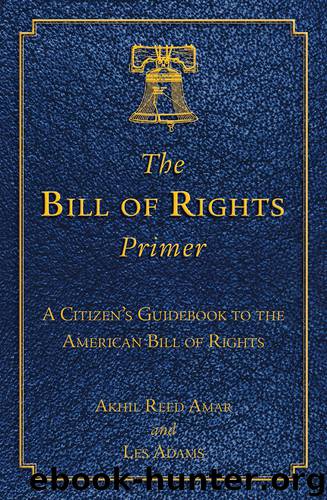The Bill of Rights Primer by Akhil Reed Amar

Author:Akhil Reed Amar
Language: eng
Format: epub
Publisher: Skyhorse Publishing
Published: 2013-01-01T05:00:00+00:00
POST-RATIFICATION COMMENTARY FORETELLING THE JUDICIAL DOCTRINE AND PROCESS OF INCORPORATION
After the Fourteenth Amendment’s ratification in 1868, when we turn to what important decision makers said when they focused on the relation between the Fourteenth Amendment and the Bill, we find powerful statements foreshadowing the eventual development of the doctrine and process of incorporation. In the years between 1868 and 1873, various members of Congress, both Democrats and Republicans, suggested that the Bill of Rights defined privileges and immunities of Americans that no state could abridge.51
Statements foreshadowing development of the incorporation doctrine
In 1872 Republican Senator John Sherman declared that the “privileges, immunities, and rights, (because I do not distinguish between them, and cannot do it,) of citizens of the United States” may be found in “the common law,” “the great charters of England,” “the Constitution of the United States,” “the constitutions of the different States,” the “Declaration of Independence,” and other authoritative declarations.52
In the 1871 circuit court case United States v. Hall, Judge (later Justice) William Woods’ opinion plainly supported incorporation: “We think, therefore, that the . . . rights enumerated in the first eight articles of amendment to the constitution of the United States are the privileges and immunities of citizens of the United States.”53
A leading judicial figure of the time, Justice Joseph Bradley, endorsed Wood’s approach in the Hall case in a letter to Woods: “The right of the people to assemble together and discuss political questions . . . is one of the most sacred rights of citizenship, and cannot be abridged by any state. . . . [This right is protected] against a state . . . as one of the privileges and immunities belonging to all citizens . . . [b]y the 14th amendment. . . .”54
Members of the executive branch and other legal commentators also shared the views expressed in Bradley’s letter. In another 1871 case, U.S. Attorney Daniel Corbin invoked Barron and then declared that “the fourteenth amendment changes all that theory, and lays the same restriction upon the States that before lay upon the Congress of the United States — that, as Congress heretofore could not interfere with the right of the citizen to keep and bear arms, now, after the adoption of the fourteenth amendment, the State cannot interfere with the right of the citizen to keep and bear arms. The right to keep and bear arms is included in the fourteenth amendment, under ‘privileges and immunities.’ “55
Justice Bradley’s publicly voiced his position in 1873 in his dissenting opinion in the famous Slaughter-House Cases.56 In his words:
The people of this country brought with them to its shores the rights of Englishmen. . . .
The people of this country brought with them to its shores the rights of Englishmen. . . . [Bradley then cited and discussed “fundamental rights” found in, among other places, Magna Charta, Blackstone’s Commentaries, etc.] But we are not bound to resort to implication, or to the constitutional history of England, to find an authoritative declaration of some of the most important privileges and immunities of citizens of the United States.
Download
This site does not store any files on its server. We only index and link to content provided by other sites. Please contact the content providers to delete copyright contents if any and email us, we'll remove relevant links or contents immediately.
Day by Elie Wiesel(2247)
The Age of Genius by A. C. Grayling(2175)
Gideon's Spies: The Secret History of the Mossad by Gordon Thomas(1954)
The Gulag Archipelago (Vintage Classics) by Aleksandr Solzhenitsyn(1730)
FATWA: Hunted in America by Pamela Geller(1724)
Columbine by Dave Cullen(1500)
Examples & Explanations: Administrative Law by William F. Funk & Richard H. Seamon(1328)
The Rule of Law by Bingham Tom(1319)
Men Explain Things to Me by Rebecca Solnit(1316)
Anatomy of Injustice by Raymond Bonner(1269)
Three Cups of Tea by Greg Mortenson(1261)
ADHD on Trial by Michael Gordon(1242)
That Every Man Be Armed by Stephen P. Halbrook(1240)
Gideon's Spies by Gordon Thomas(1218)
Palestinian Walks by Raja Shehadeh(1144)
The Source by James A. Michener(1135)
Fast Times in Palestine by Pamela Olson(1117)
Nothing to Envy by Barbara Demick(1042)
Constitutional Theory by Carl Schmitt(1037)
